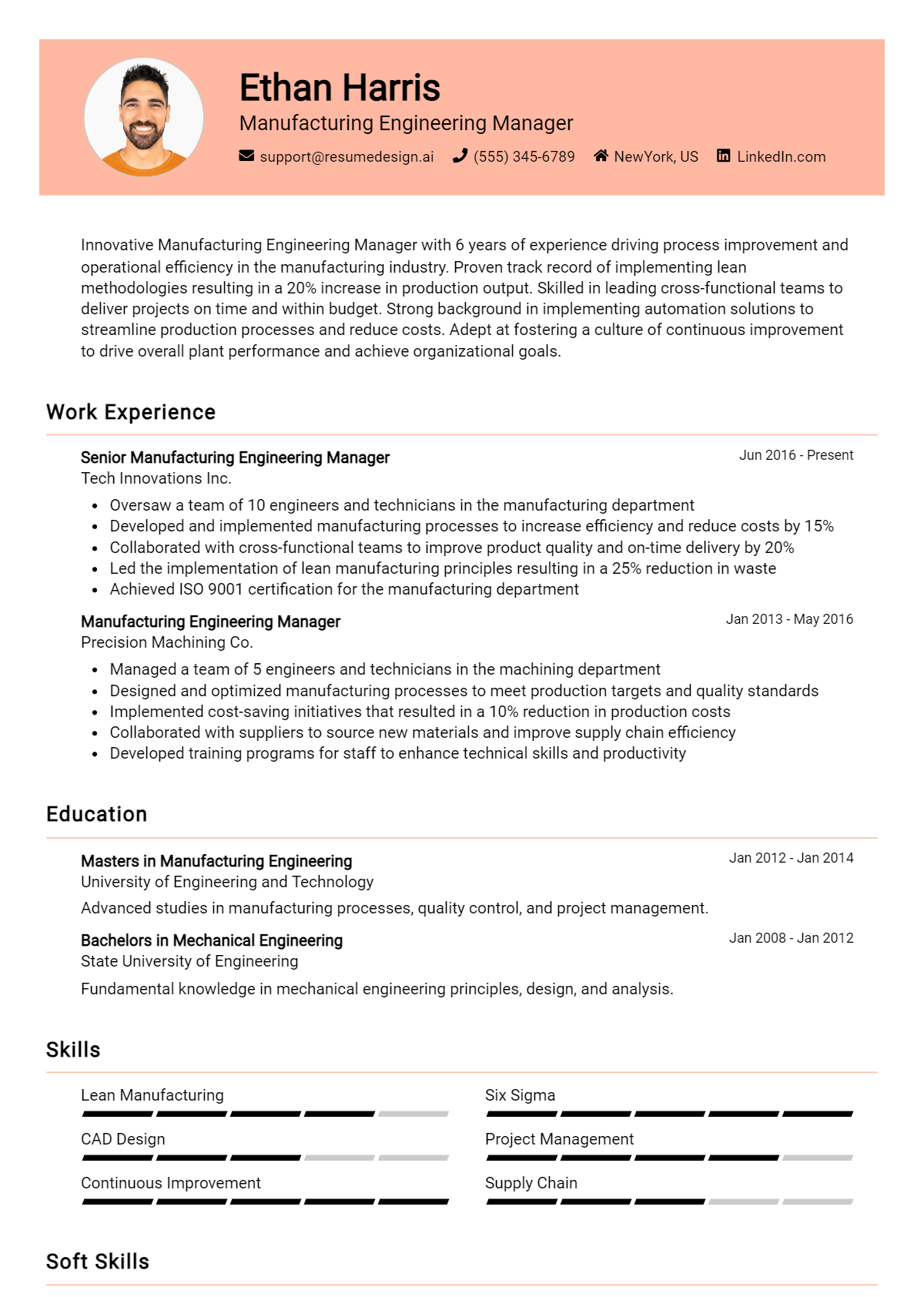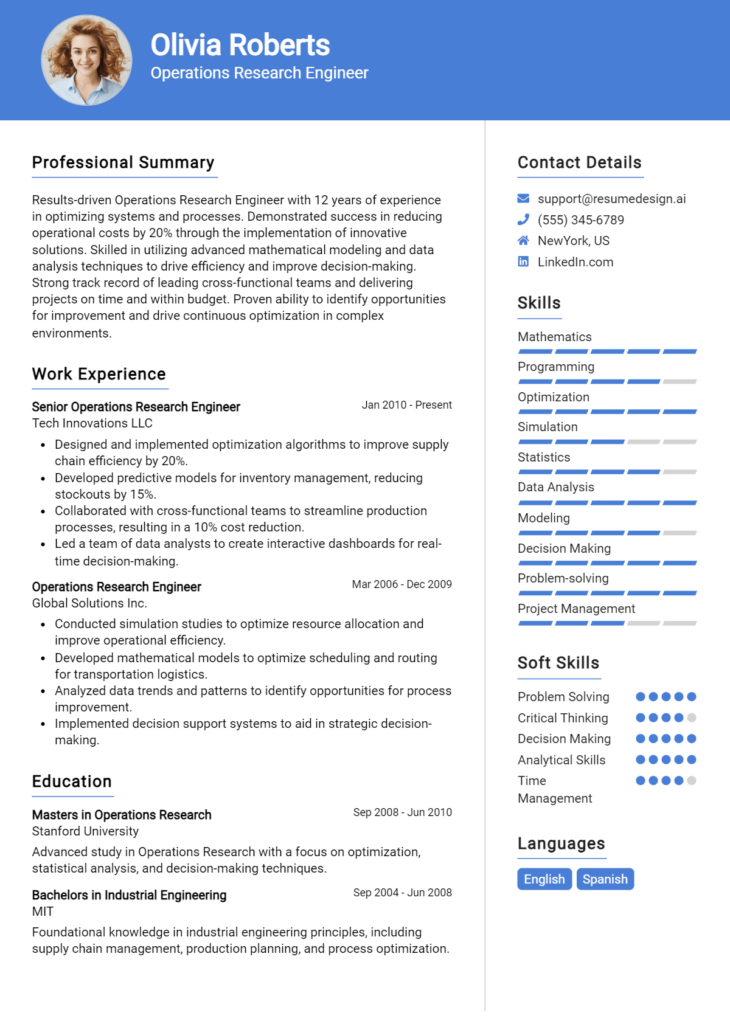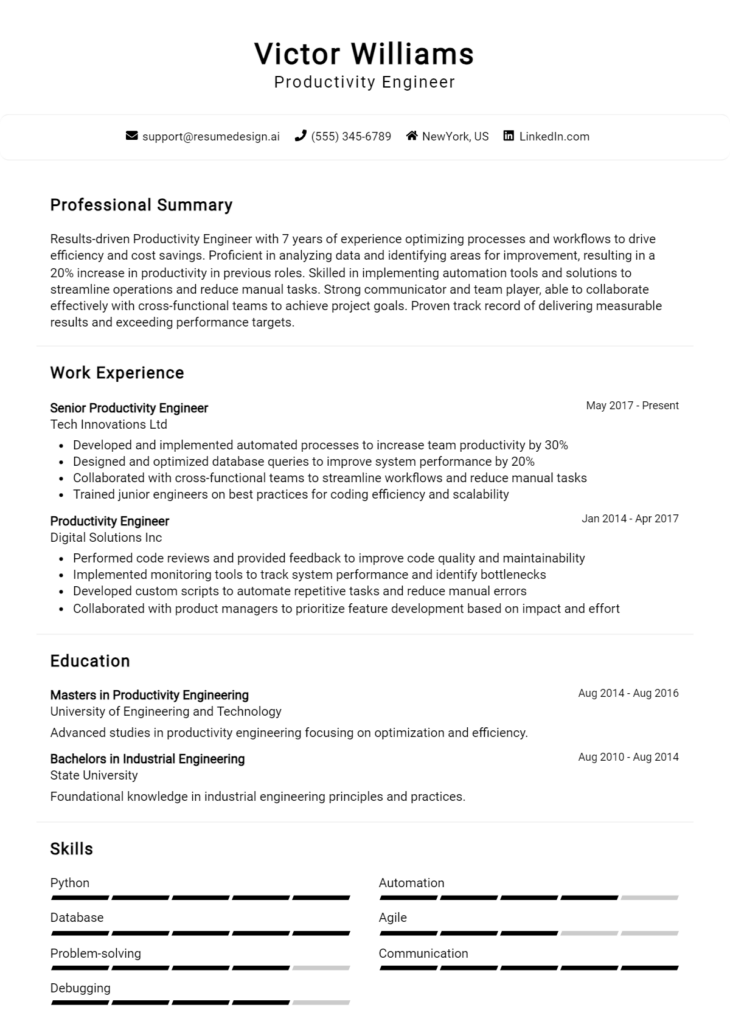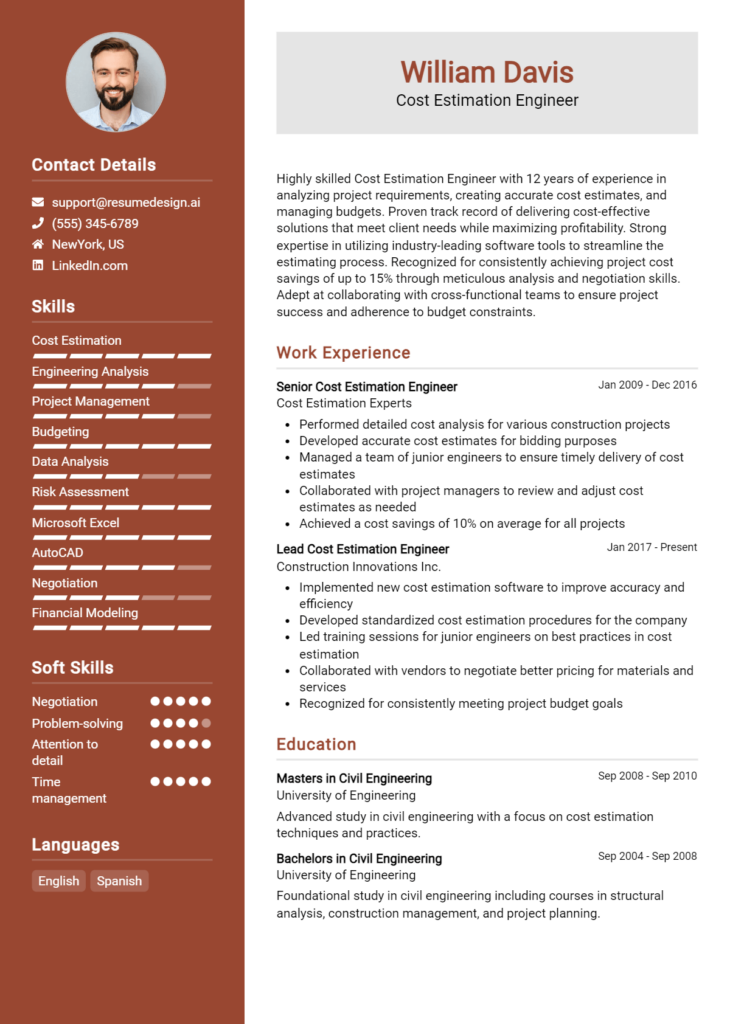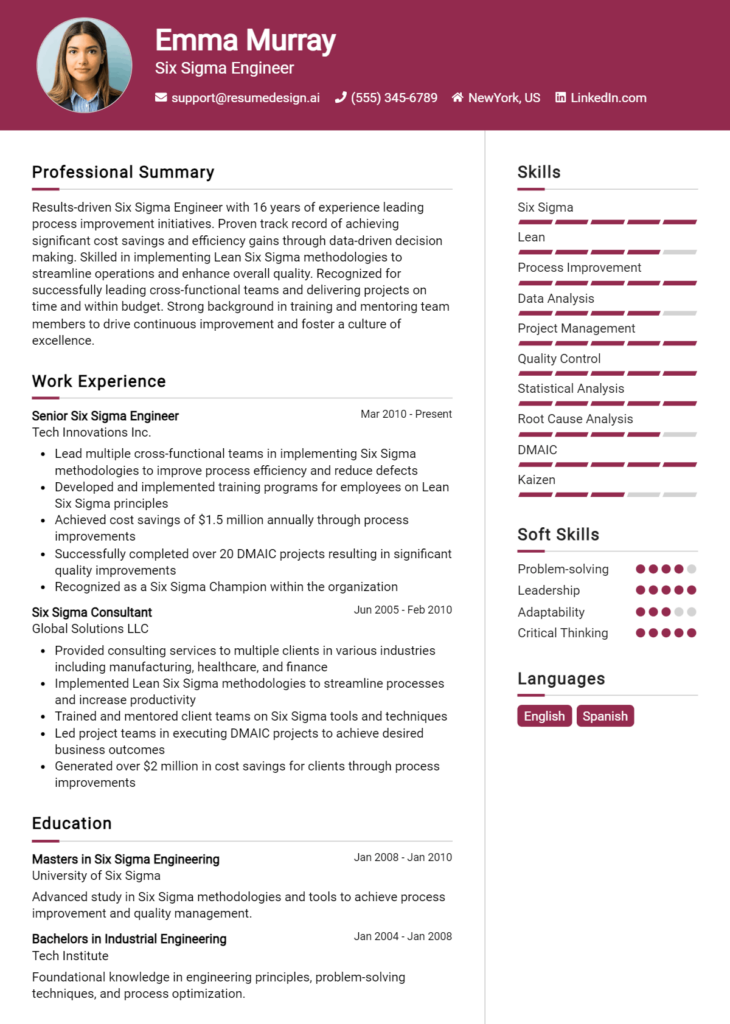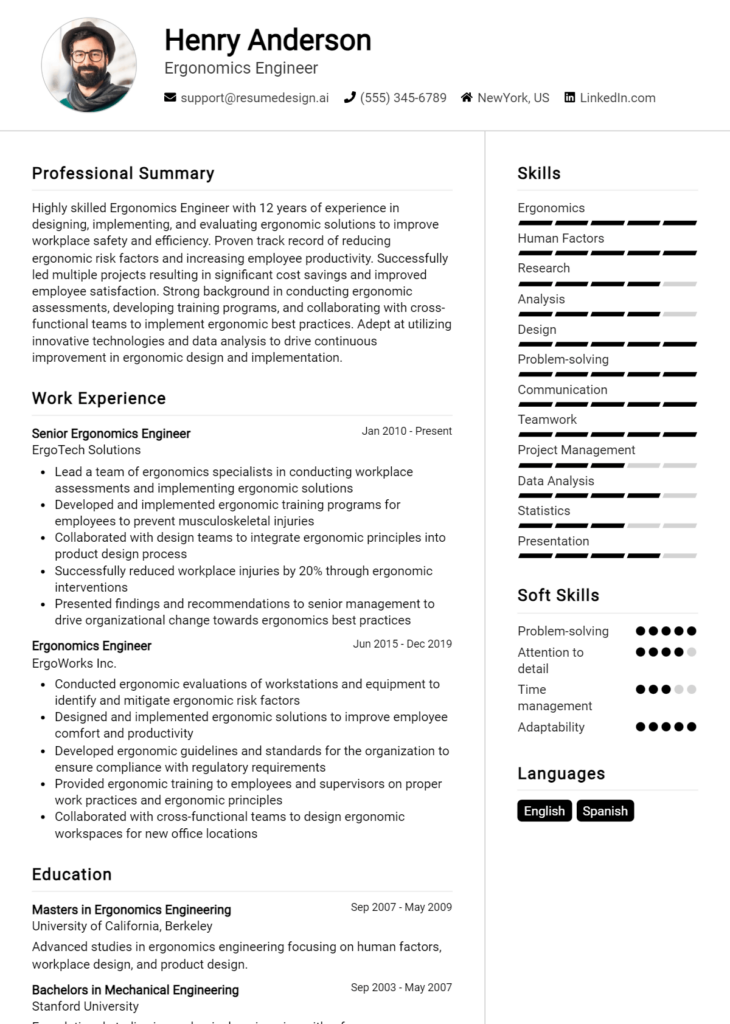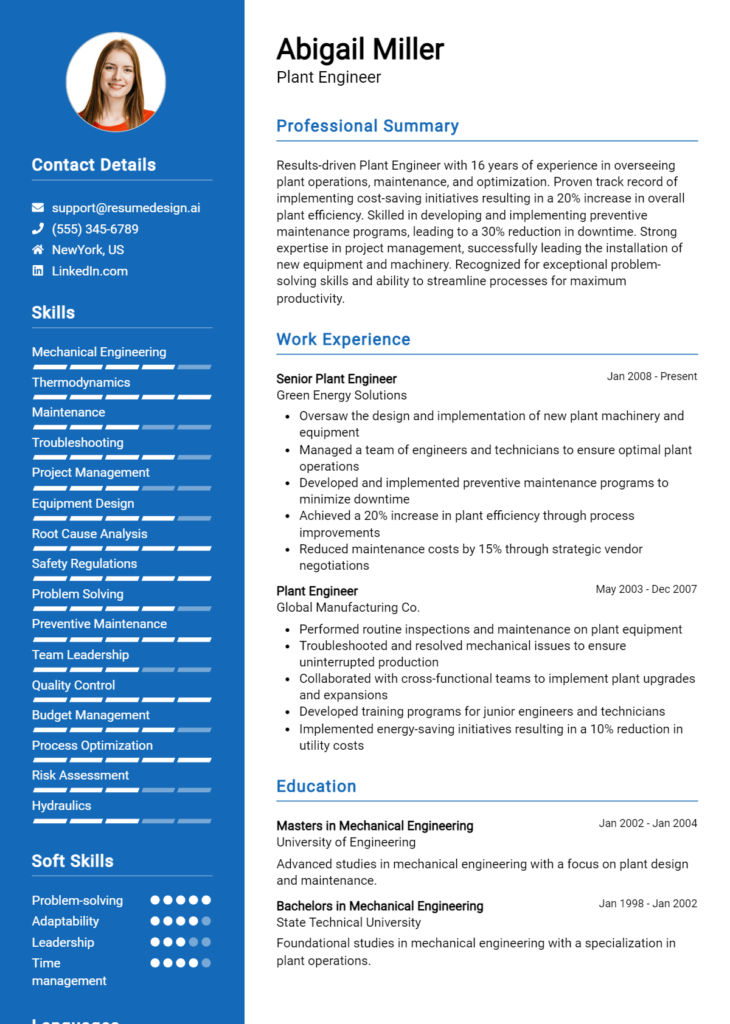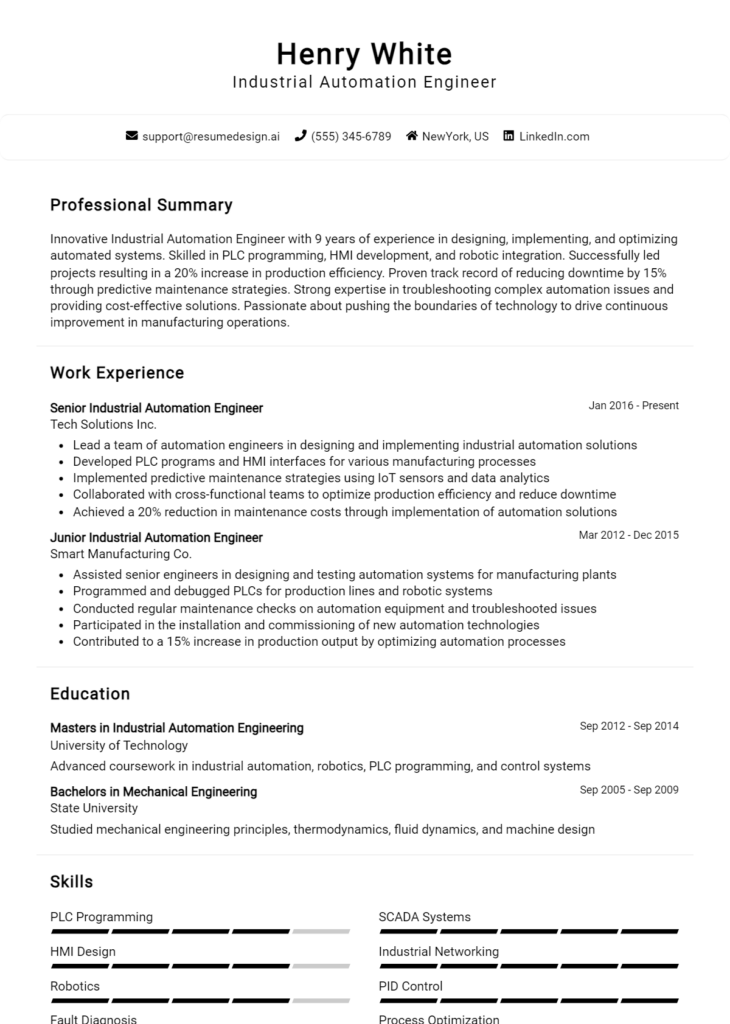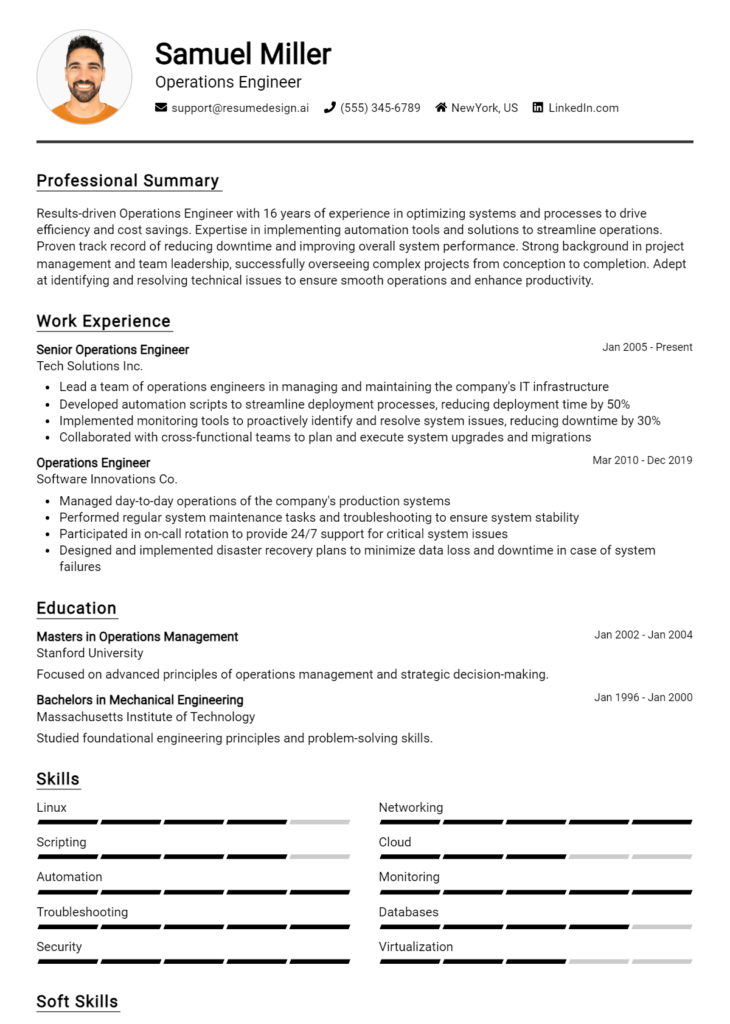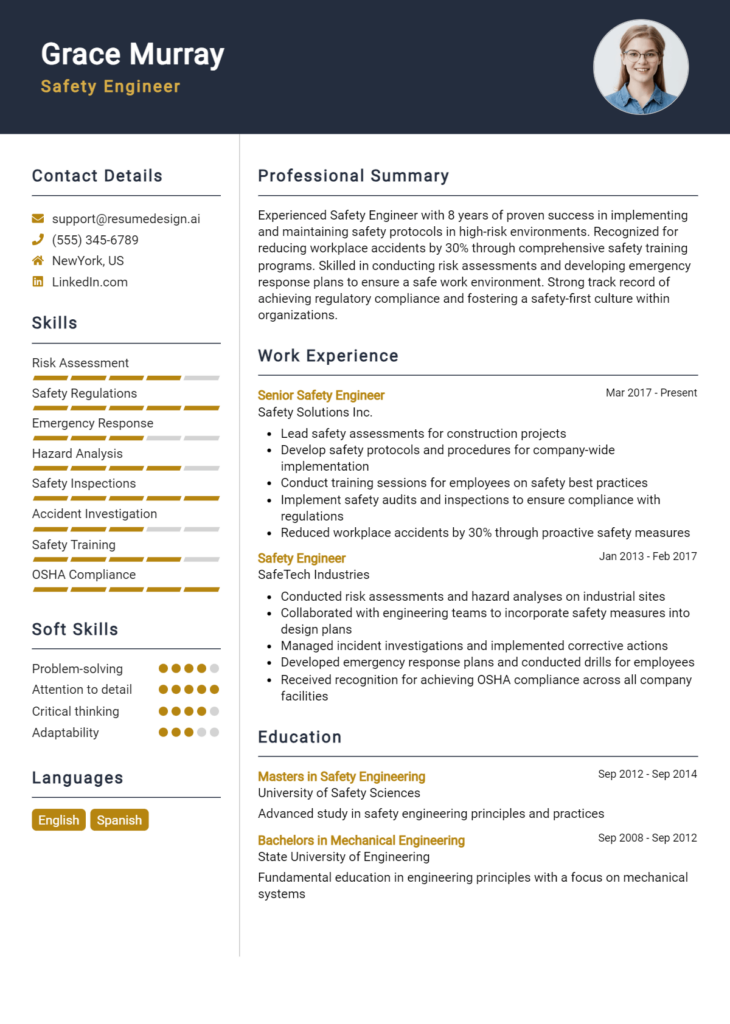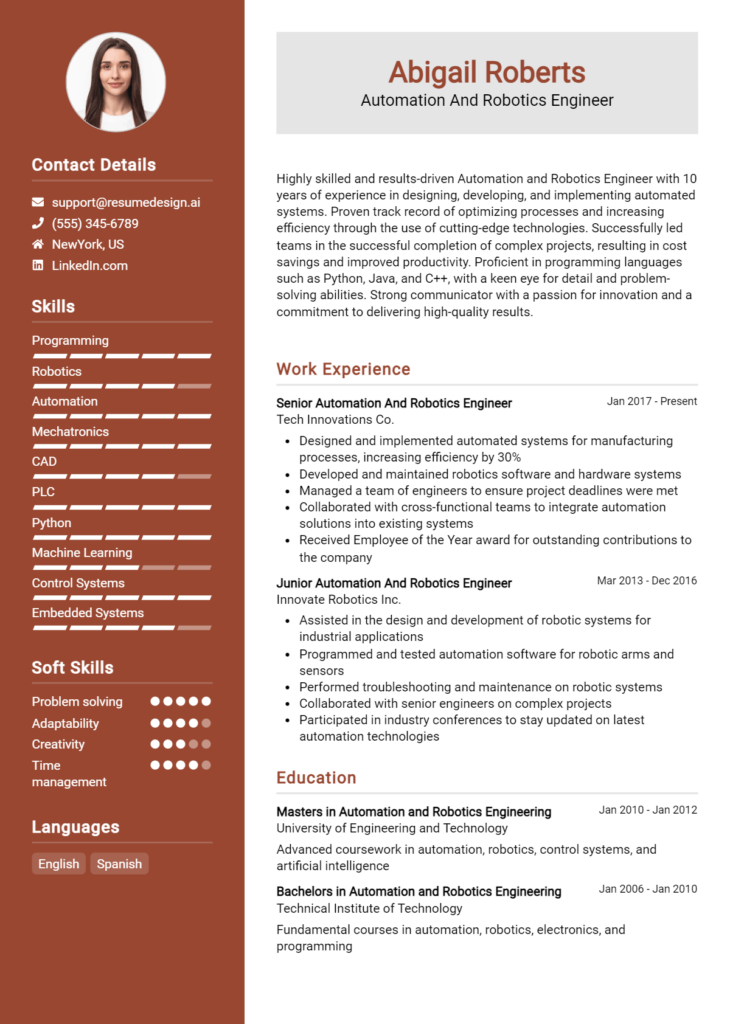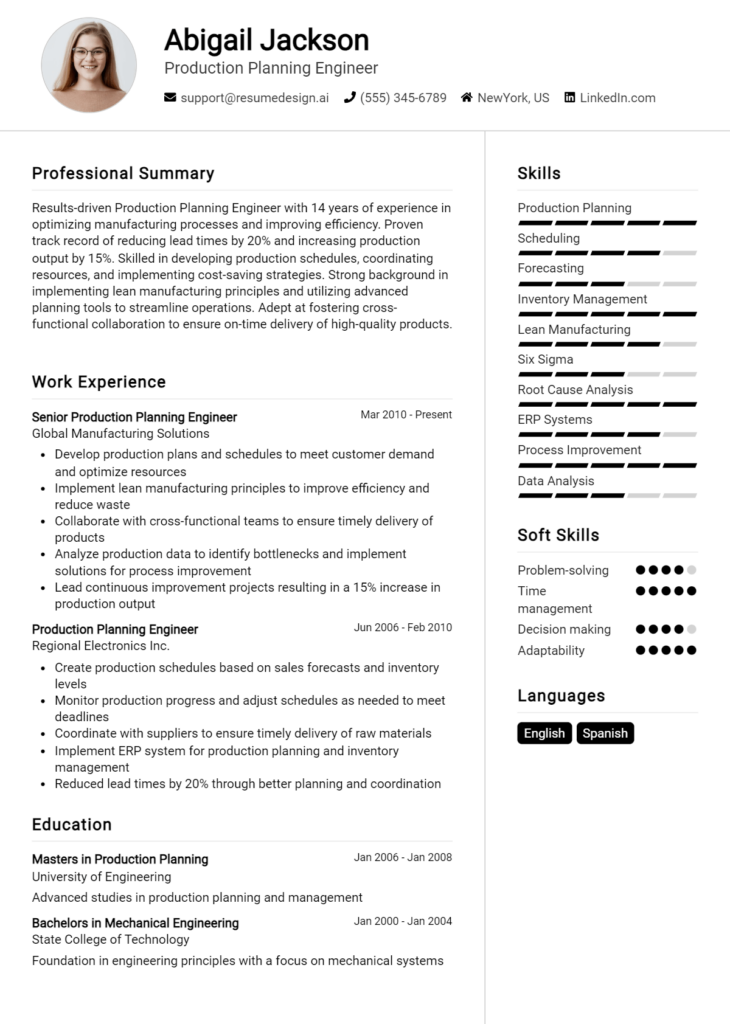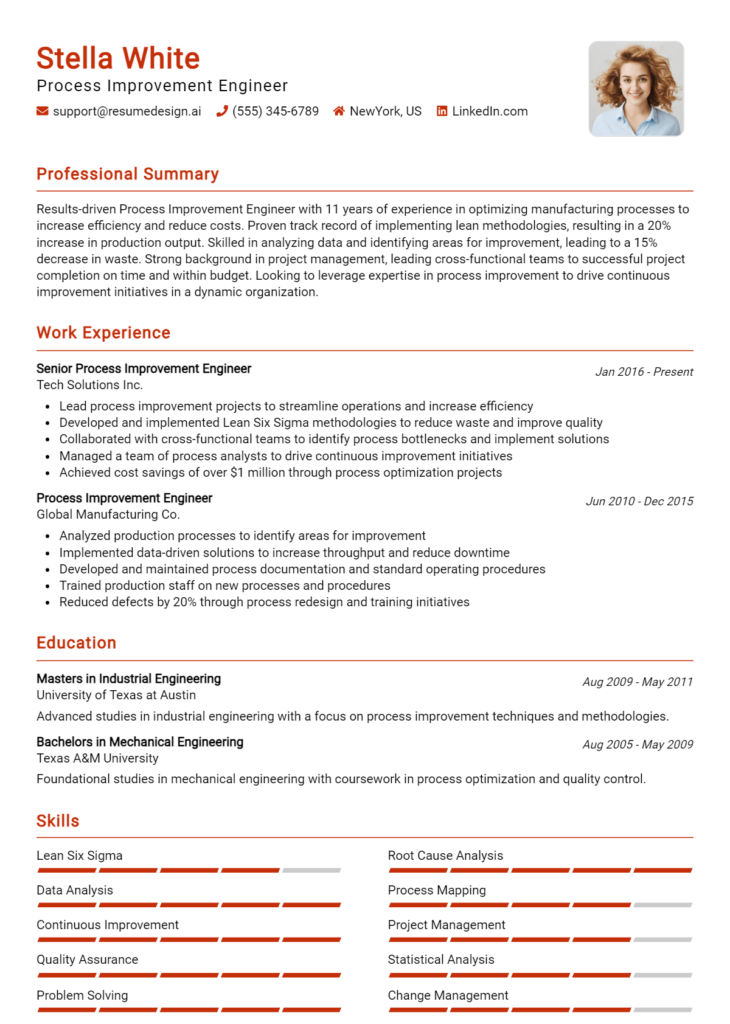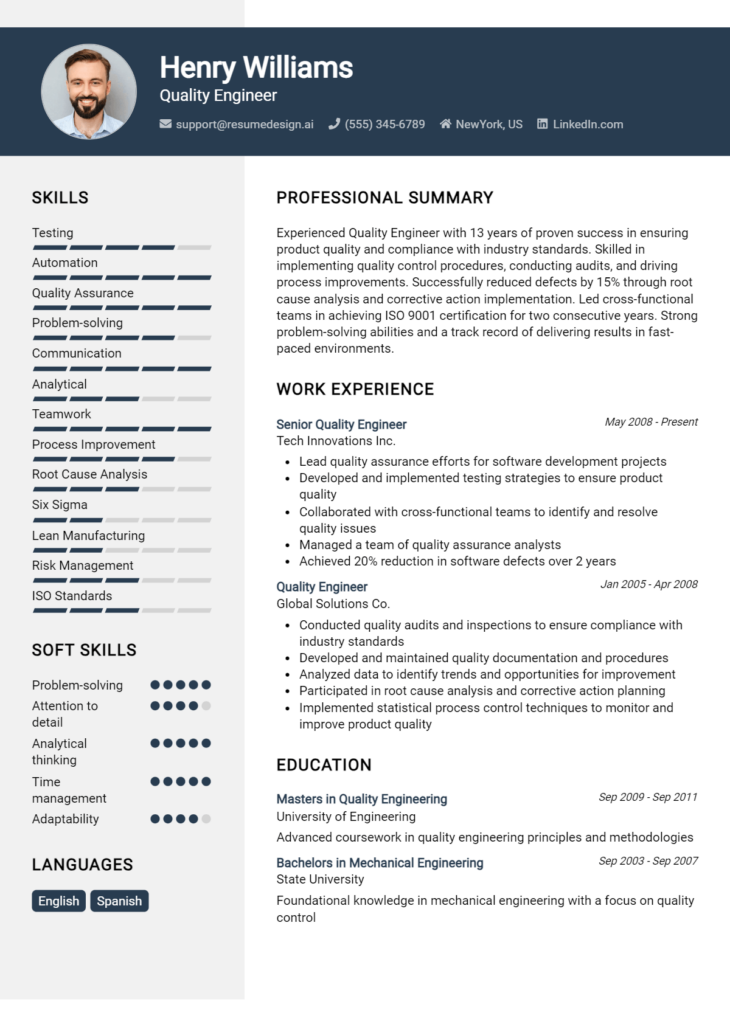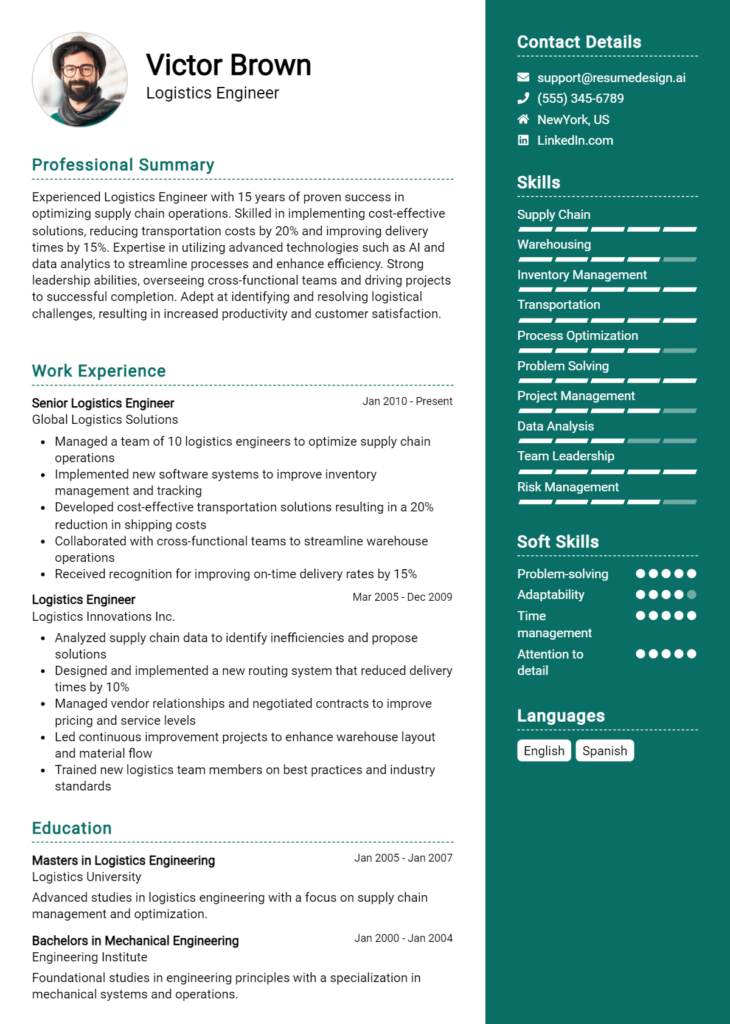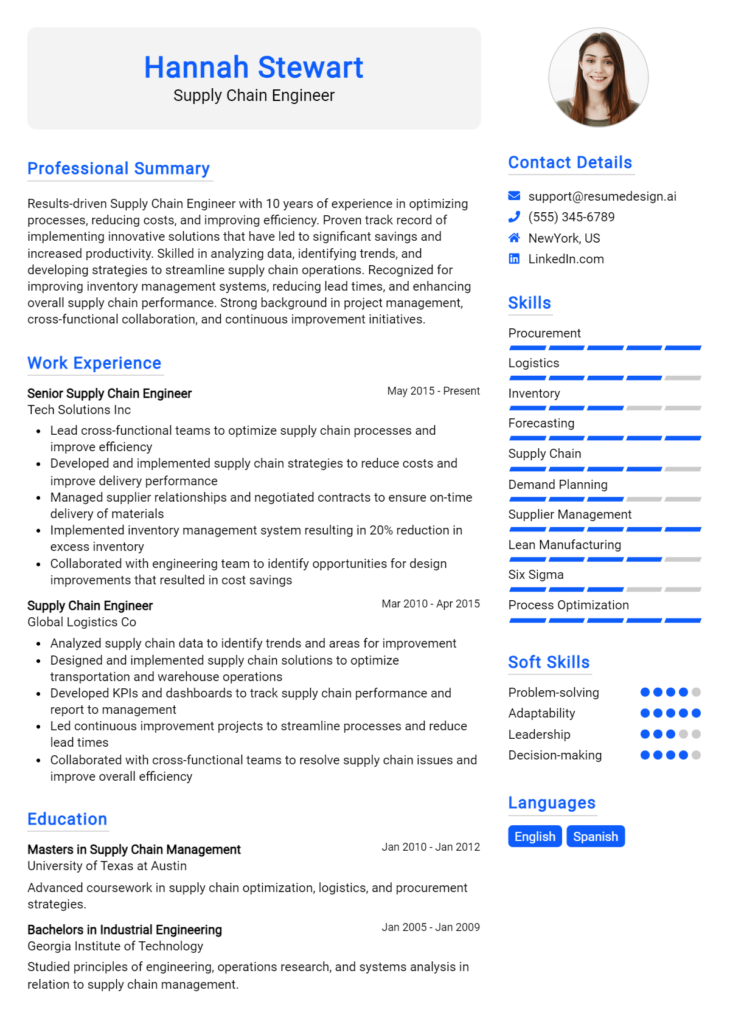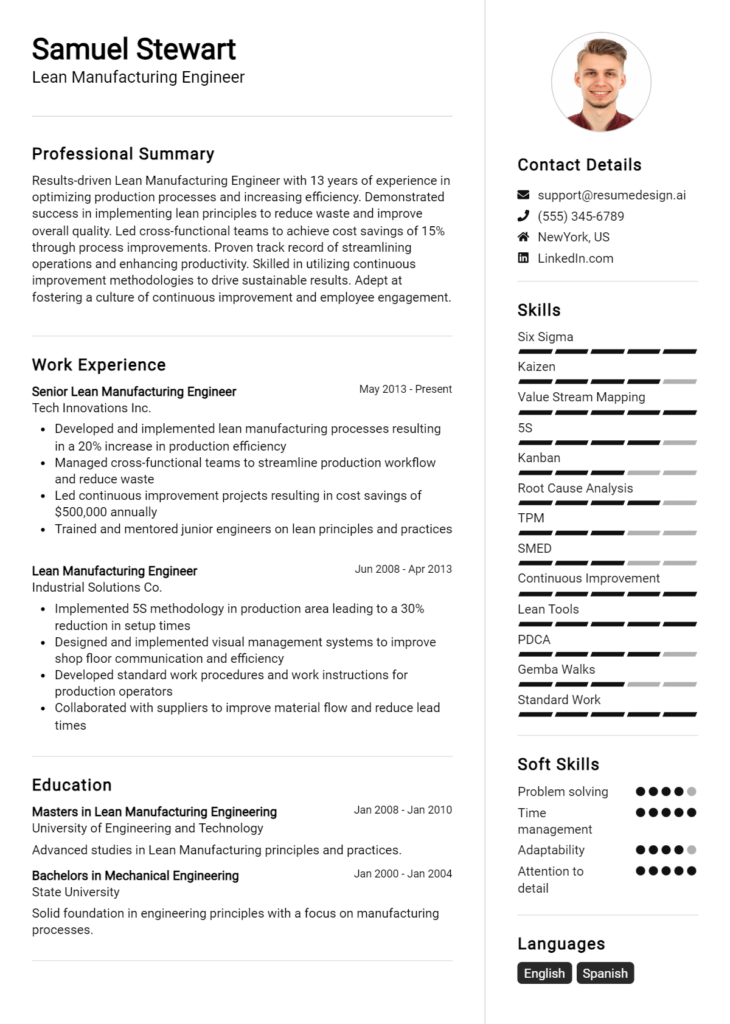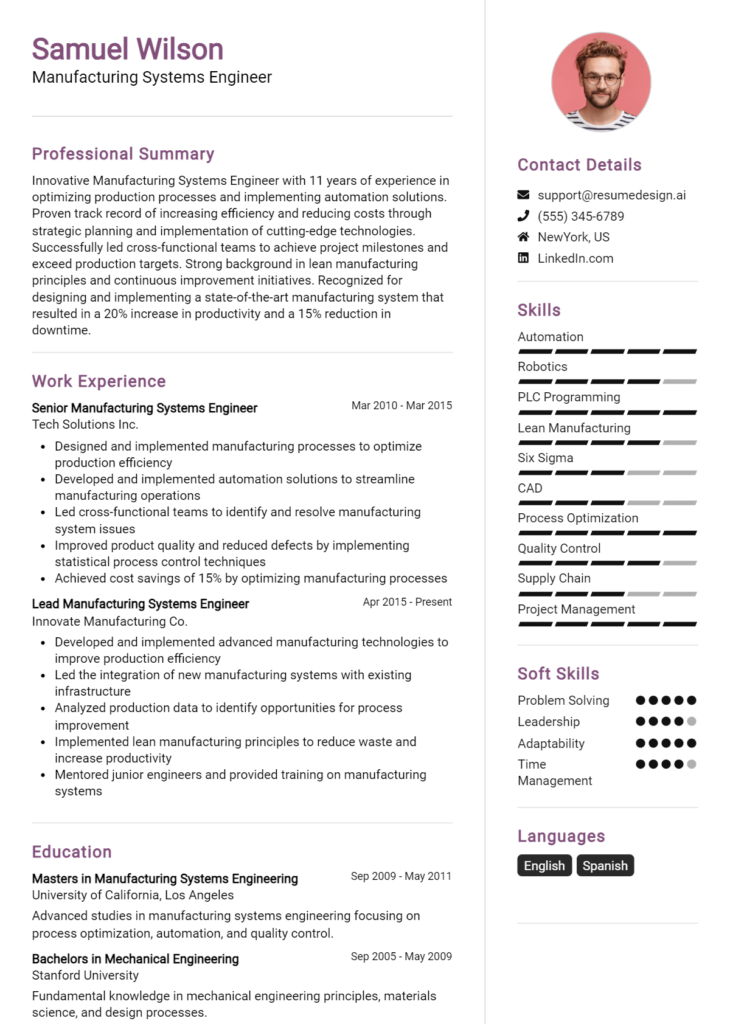Manufacturing Engineering Manager Core Responsibilities
The Manufacturing Engineering Manager plays a pivotal role in ensuring efficient production processes by bridging the gap between engineering, production, and quality assurance teams. Key responsibilities include overseeing manufacturing processes, improving production workflows, and implementing cost-saving measures. Essential skills include technical expertise, operational management, and strong problem-solving abilities, all crucial for meeting organizational goals. A well-structured resume that highlights these qualifications can effectively demonstrate how a candidate can contribute to the success of the company.
Common Responsibilities Listed on Manufacturing Engineering Manager Resume
- Develop and implement manufacturing processes and systems.
- Lead cross-functional teams to optimize production efficiency.
- Analyze production data to identify areas for improvement.
- Ensure compliance with safety and quality standards.
- Collaborate with R&D to integrate new technologies.
- Manage budgets and resources for manufacturing projects.
- Conduct root cause analysis for production issues.
- Train and mentor engineering staff on best practices.
- Prepare and present reports to senior management.
- Evaluate and select suppliers for manufacturing materials.
- Implement lean manufacturing techniques to reduce waste.
- Oversee the maintenance of manufacturing equipment.
High-Level Resume Tips for Manufacturing Engineering Manager Professionals
In the competitive field of manufacturing engineering, a well-crafted resume is not just a document; it is often the first impression a candidate makes on potential employers. For Manufacturing Engineering Manager professionals, this means that your resume must effectively capture both your technical skills and your notable achievements in the industry. It serves as a vital marketing tool that showcases your capabilities and sets you apart from other candidates. This guide will provide practical and actionable resume tips specifically tailored for Manufacturing Engineering Manager professionals, ensuring your resume stands out in a crowded job market.
Top Resume Tips for Manufacturing Engineering Manager Professionals
- Tailor your resume to the job description by incorporating keywords and phrases that match the requirements of the position.
- Highlight relevant experience by focusing on roles and projects that directly relate to manufacturing engineering management.
- Quantify your achievements with concrete metrics, such as cost savings, efficiency improvements, or production increases you've led.
- Showcase your leadership skills by including examples of team management, project leadership, and cross-functional collaboration.
- Emphasize industry-specific skills such as Six Sigma, Lean Manufacturing, or CAD software proficiency that are crucial in manufacturing settings.
- Include certifications or professional development courses that demonstrate your commitment to continuous learning in engineering management.
- Utilize a clear and professional format that enhances readability, ensuring your key information stands out to hiring managers.
- Keep your resume concise, ideally no longer than two pages, focusing on the most critical and relevant information.
- Incorporate a summary statement at the beginning of your resume that encapsulates your career goals and key qualifications.
By implementing these tips, you can significantly increase your chances of landing a job in the Manufacturing Engineering Manager field. A well-structured and targeted resume will not only showcase your qualifications effectively but also demonstrate your understanding of the industry's demands, making you a more attractive candidate to potential employers.
Why Resume Headlines & Titles are Important for Manufacturing Engineering Manager
In the competitive landscape of manufacturing engineering, a well-crafted resume headline or title plays a crucial role in capturing the attention of hiring managers. For a Manufacturing Engineering Manager, this succinct phrase serves as the first impression and can significantly influence the decision to review the entire resume. A strong headline should effectively summarize the candidate's key qualifications, aligning with the job requirements while showcasing their expertise. It must be concise, relevant, and directly related to the specific position being pursued, ensuring that it resonates with the hiring team's needs and expectations.
Best Practices for Crafting Resume Headlines for Manufacturing Engineering Manager
- Keep it concise: Aim for one impactful phrase that encapsulates your expertise.
- Be role-specific: Tailor the headline to reflect your fit for the Manufacturing Engineering Manager position.
- Highlight key strengths: Focus on your most relevant skills, experiences, or accomplishments.
- Use industry keywords: Incorporate terminology that aligns with the manufacturing engineering field.
- Avoid jargon: Keep language clear and professional without unnecessary complexity.
- Showcase results: If possible, indicate achievements that demonstrate your impact in previous roles.
- Consider your audience: Think about what hiring managers value most in a candidate for this role.
- Test variations: Experiment with different headlines to see which resonates best with your target audience.
Example Resume Headlines for Manufacturing Engineering Manager
Strong Resume Headlines
Dynamic Manufacturing Engineering Manager with 10+ Years of Experience in Lean Process Improvements
Results-Driven Leader Specializing in Cost Reduction and Quality Assurance in High-Volume Production
Innovative Engineering Manager Committed to Enhancing Operational Efficiency and Driving Team Performance
Weak Resume Headlines
Experienced Manager Looking for Opportunities
Engineering Professional with Various Skills
The strong headlines are effective because they clearly communicate the candidate's expertise and accomplishments in a way that is directly relevant to the Manufacturing Engineering Manager role. They contain specific information that showcases the individual’s strengths and aligns with the needs of potential employers. In contrast, the weak headlines fail to impress due to their vagueness and lack of focus, offering no real insight into the candidate's qualifications or unique value proposition. This lack of specificity can easily lead hiring managers to overlook these candidates in favor of those with more compelling resumes.
Writing an Exceptional Manufacturing Engineering Manager Resume Summary
A resume summary is a crucial element for a Manufacturing Engineering Manager as it serves as the first impression to hiring managers. An exceptional summary quickly captures attention by succinctly showcasing key skills, extensive experience, and notable accomplishments relevant to the role. This brief yet impactful section should be tailored specifically to the job being applied for, ensuring that it reflects the candidate's suitability and readiness to meet the demands of the position. A well-crafted summary can differentiate a candidate from the competition, emphasizing their unique value proposition in the manufacturing engineering landscape.
Best Practices for Writing a Manufacturing Engineering Manager Resume Summary
- Quantify Achievements: Use specific numbers to demonstrate the impact of your work, such as cost savings or efficiency improvements.
- Focus on Relevant Skills: Highlight the technical and managerial skills that are directly applicable to the Manufacturing Engineering Manager role.
- Tailor to the Job Description: Customize your summary to align with the requirements and responsibilities outlined in the job posting.
- Be Concise: Keep the summary brief, ideally no more than 3-5 sentences, to maintain the hiring manager's attention.
- Use Active Language: Employ strong action verbs to convey your accomplishments and responsibilities dynamically.
- Highlight Leadership Experience: Emphasize any managerial roles or leading projects to showcase your capability in overseeing teams and processes.
- Incorporate Industry Keywords: Use terminology and phrases that resonate within the manufacturing sector to pass through applicant tracking systems.
- Showcase Continuous Improvement: Mention your commitment to process optimization and innovation within manufacturing practices.
Example Manufacturing Engineering Manager Resume Summaries
Strong Resume Summaries
Results-driven Manufacturing Engineering Manager with over 10 years of experience leading cross-functional teams to achieve a 20% reduction in production costs while improving product quality. Proven expertise in Lean Manufacturing and Six Sigma methodologies.
Dynamic Engineering Manager with a track record of enhancing manufacturing processes, achieving a 30% increase in efficiency through the implementation of automated systems. Adept at leading projects from concept to completion while ensuring compliance with safety and quality standards.
Innovative Manufacturing Engineering Manager with 15 years of experience in the automotive industry. Spearheaded initiatives that led to a 25% decrease in waste and a 40% increase in production throughput, driving significant cost savings for the organization.
Weak Resume Summaries
Experienced manager with skills in engineering and manufacturing looking for a new opportunity.
Manufacturing Engineering Manager with a background in production. I aim to improve processes and lead teams.
The strong resume summaries are considered effective because they provide quantifiable achievements and specific skills that directly relate to the Manufacturing Engineering Manager role. They demonstrate a clear understanding of the job requirements and showcase the candidate’s accomplishments. In contrast, the weak resume summaries are vague and lack concrete details or measurable outcomes, making them less impactful and failing to capture the attention of hiring managers.
Work Experience Section for Manufacturing Engineering Manager Resume
The work experience section is a critical component of a Manufacturing Engineering Manager resume, as it serves as a powerful showcase of the candidate's technical skills, leadership abilities, and capacity to deliver high-quality products. This section not only highlights relevant experiences but also provides quantifiable achievements that demonstrate the candidate's effectiveness in driving process improvements, optimizing production efficiency, and managing cross-functional teams. Aligning these experiences with industry standards is crucial to establishing credibility and showcasing the ability to contribute to organizational success in the manufacturing sector.
Best Practices for Manufacturing Engineering Manager Work Experience
- Use action verbs to begin bullet points, clearly illustrating your role in each achievement.
- Quantify results wherever possible, such as percentage improvements, cost savings, or production increases.
- Focus on specific technical skills relevant to manufacturing engineering, such as Lean methodologies or Six Sigma practices.
- Highlight leadership experiences, emphasizing team management and mentorship roles.
- Include cross-functional collaboration examples, showcasing your ability to work with various departments.
- Tailor your experience to align with industry standards and job descriptions to make your resume more relevant.
- Showcase problem-solving skills by detailing challenges faced and resolutions implemented.
- Keep descriptions concise and focused on outcomes rather than just duties performed.
Example Work Experiences for Manufacturing Engineering Manager
Strong Experiences
- Led a team of 15 engineers to implement a Lean manufacturing initiative, resulting in a 25% reduction in production waste and a 15% increase in overall efficiency within six months.
- Managed a cross-functional project to redesign a key product line, achieving a 30% decrease in manufacturing costs while maintaining product quality standards.
- Developed and executed a training program for new manufacturing technologies, enhancing team competency and reducing machine downtime by 20%.
- Collaborated with R&D to integrate new materials into the production process, successfully decreasing lead time by 40% and improving product durability.
Weak Experiences
- Responsible for overseeing production processes and ensuring quality.
- Worked on various engineering projects without specific details or outcomes mentioned.
- Participated in team meetings to discuss manufacturing issues.
- Helped implement changes in the manufacturing process, but no measurable impact was documented.
The examples of strong experiences are considered effective because they include specific, quantifiable outcomes that demonstrate leadership, technical expertise, and successful collaboration. They illustrate the candidate's direct contributions to manufacturing processes and outcomes, providing clear evidence of their capabilities. In contrast, the weak experiences lack detail, measurable results, and clear descriptions of the candidate's role, making them less impactful and failing to convey the full scope of their contributions in the manufacturing engineering field.
Education and Certifications Section for Manufacturing Engineering Manager Resume
The education and certifications section of a Manufacturing Engineering Manager resume plays a crucial role in establishing the candidate's qualifications and expertise in the field. This section not only showcases the academic background, such as degrees in engineering or related disciplines, but also emphasizes industry-relevant certifications that demonstrate a commitment to professional development and continuous learning. By including relevant coursework, specialized training, and recognized credentials, candidates can significantly enhance their credibility and illustrate their alignment with the demands of the job role, helping them stand out in a competitive job market.
Best Practices for Manufacturing Engineering Manager Education and Certifications
- Include degrees that are directly relevant to manufacturing engineering, such as a Bachelor’s or Master’s in Industrial Engineering, Mechanical Engineering, or Manufacturing Technology.
- List industry-recognized certifications, such as Lean Six Sigma, Certified Manufacturing Engineer (CMfgE), or Project Management Professional (PMP).
- Highlight any specialized training or workshops that pertain to the latest manufacturing technologies or methodologies.
- Provide relevant coursework that reflects knowledge of key engineering principles, production processes, and quality control.
- Ensure that the most significant and relevant qualifications are listed first to capture the employer's attention.
- Keep the formatting consistent and professional, using bullet points for clarity and ease of reading.
- Avoid including outdated or irrelevant degrees and certifications that do not align with the current manufacturing landscape.
- Regularly update this section to reflect any new qualifications or learning experiences acquired.
Example Education and Certifications for Manufacturing Engineering Manager
Strong Examples
- Bachelor of Science in Industrial Engineering, University of Michigan, 2010
- Certified Lean Six Sigma Black Belt, American Society for Quality, 2018
- Master of Science in Manufacturing Systems Engineering, Georgia Tech, 2015
- Certification in Advanced Manufacturing Technologies, National Institute of Standards and Technology, 2020
Weak Examples
- Bachelor of Arts in History, University of California, 2008
- Certification in Microsoft Office Suite, 2015
- Diploma in Computer Programming, Community College, 2012
- Certification in First Aid and CPR, 2021
The examples listed as strong demonstrate a clear alignment with the Manufacturing Engineering Manager role, showcasing relevant degrees and industry-recognized certifications that are essential in manufacturing environments. In contrast, the weak examples present educational qualifications and certifications that are either outdated, irrelevant, or too generalized to contribute meaningfully to the candidate's qualifications for this specific role. Highlighting strong educational backgrounds and certifications positions candidates as well-equipped professionals in the manufacturing engineering field, while weak examples can detract from their overall appeal to potential employers.
Top Skills & Keywords for Manufacturing Engineering Manager Resume
As a Manufacturing Engineering Manager, possessing the right skills is crucial for driving efficiency, innovation, and productivity within production environments. A well-crafted resume that highlights both hard and soft skills can make a significant difference in showcasing your qualifications to potential employers. These skills not only underline your technical expertise but also demonstrate your ability to lead teams, manage projects, and implement strategic initiatives. A balanced combination of these skills will set you apart in a competitive job market, making it essential to articulate your capabilities effectively in your resume.
Top Hard & Soft Skills for Manufacturing Engineering Manager
Soft Skills
- Leadership
- Communication
- Problem-solving
- Team Collaboration
- Time Management
- Adaptability
- Conflict Resolution
- Critical Thinking
- Decision Making
- Project Management
- Interpersonal Skills
- Negotiation
- Creativity
- Mentorship
- Emotional Intelligence
Hard Skills
- Lean Manufacturing
- Six Sigma Methodologies
- CAD Software Proficiency
- Quality Assurance Techniques
- Process Optimization
- Statistical Analysis
- Production Planning
- Cost Reduction Strategies
- Regulatory Compliance Knowledge
- Automation Technologies
- Supply Chain Management
- Equipment Maintenance
- Data Analysis
- Manufacturing Software (e.g., ERP Systems)
- Technical Documentation
- Safety Standards Compliance
- Material Science Knowledge
Stand Out with a Winning Manufacturing Engineering Manager Cover Letter
Dear [Hiring Manager's Name],
I am writing to express my interest in the Manufacturing Engineering Manager position at [Company Name] as advertised on [Job Board/Company Website]. With over [X years] of experience in the manufacturing sector, I have honed my skills in process optimization, team leadership, and innovative engineering solutions. My background in [specific technologies or methodologies relevant to the job] aligns perfectly with the requirements of your team, and I am eager to contribute to [Company Name]'s continued success and excellence in manufacturing.
In my previous role at [Previous Company Name], I successfully led a team of engineers in designing and implementing process improvements that increased production efficiency by [specific percentage] while reducing waste and costs. By fostering a culture of collaboration and continuous improvement, I empowered my team to identify and tackle challenges proactively. My hands-on approach and commitment to mentoring have not only enhanced team performance but also resulted in a significant boost in employee morale and retention. I am excited about the opportunity to bring this same level of dedication and strategic thinking to [Company Name].
I am particularly impressed by [mention any specific projects, values, or goals of the company], and I am eager to leverage my expertise in [specific relevant skills or technologies] to drive innovation and improve operational performance. I am confident that my proactive leadership style and commitment to excellence in manufacturing will make a positive impact on your organization. I look forward to the opportunity to discuss how I can contribute to the success of [Company Name] and support your objectives in the manufacturing sector.
Thank you for considering my application. I hope to discuss my qualifications further in an interview setting. Please feel free to contact me at [Your Phone Number] or [Your Email Address]. I look forward to hearing from you soon.
Sincerely,
[Your Name]
Common Mistakes to Avoid in a Manufacturing Engineering Manager Resume
When crafting a resume for the role of a Manufacturing Engineering Manager, it's crucial to present a clear, concise, and compelling narrative of your qualifications and experiences. However, many candidates make common mistakes that can hinder their chances of landing an interview. By avoiding these pitfalls, you can enhance the effectiveness of your resume and showcase your expertise in manufacturing engineering. Here are some common mistakes to watch out for:
Vague Job Descriptions: Failing to provide specific details about your responsibilities and achievements can make it hard for hiring managers to gauge your impact. Use metrics and examples to illustrate your contributions.
Ignoring Keywords: Many companies use Applicant Tracking Systems (ATS) to screen resumes. Not incorporating relevant industry keywords can lead to your resume being overlooked.
Overly Complex Language: While technical jargon can be important, using overly complex language can alienate readers. Aim for clarity and simplicity to ensure your skills are understood.
Lack of Customization: Sending a generic resume for every job application can diminish your chances. Tailor your resume to each position by aligning your skills and experiences with the job description.
Neglecting Soft Skills: Focusing solely on technical skills may overlook the importance of soft skills like leadership, communication, and teamwork. Highlight these qualities as they are vital for managerial roles.
Poor Formatting: A cluttered or unprofessional layout can deter hiring managers from reading your resume. Use a clean, organized format with clear headings and bullet points for easy navigation.
Omitting Relevant Certifications: Manufacturing engineering often requires specific certifications. Failing to include these can leave a gap in your qualifications that might be critical to potential employers.
Ignoring Achievements: Listing duties without mentioning accomplishments can make your experience seem less impactful. Be sure to showcase your successes and how they benefited your previous employers.
Conclusion
As we conclude our exploration of the Manufacturing Engineering Manager role, it's essential to recognize the multifaceted responsibilities that come with this position. From leading engineering teams to optimizing production processes, the Manufacturing Engineering Manager plays a crucial role in driving efficiency and innovation within an organization. Key highlights include the importance of strong leadership skills, a solid understanding of manufacturing technologies, and the ability to implement best practices for quality assurance and productivity improvement.
In today's competitive job market, having a standout resume is vital for securing your next opportunity as a Manufacturing Engineering Manager. Take the time to review and refine your resume to ensure it effectively showcases your skills, experiences, and accomplishments.
To assist you in this process, consider utilizing the following resources:
- Explore a variety of resume templates that can help you structure your resume effectively.
- Use a resume builder to create a professional and polished resume tailored to your career goals.
- Check out resume examples for inspiration and guidance on how to highlight your unique qualifications.
- Don’t forget to complement your resume with a compelling cover letter; browse through our selection of cover letter templates to find one that resonates with your style.
Now is the perfect time to invest in your career by updating your Manufacturing Engineering Manager resume and ensuring it stands out in the job market!

